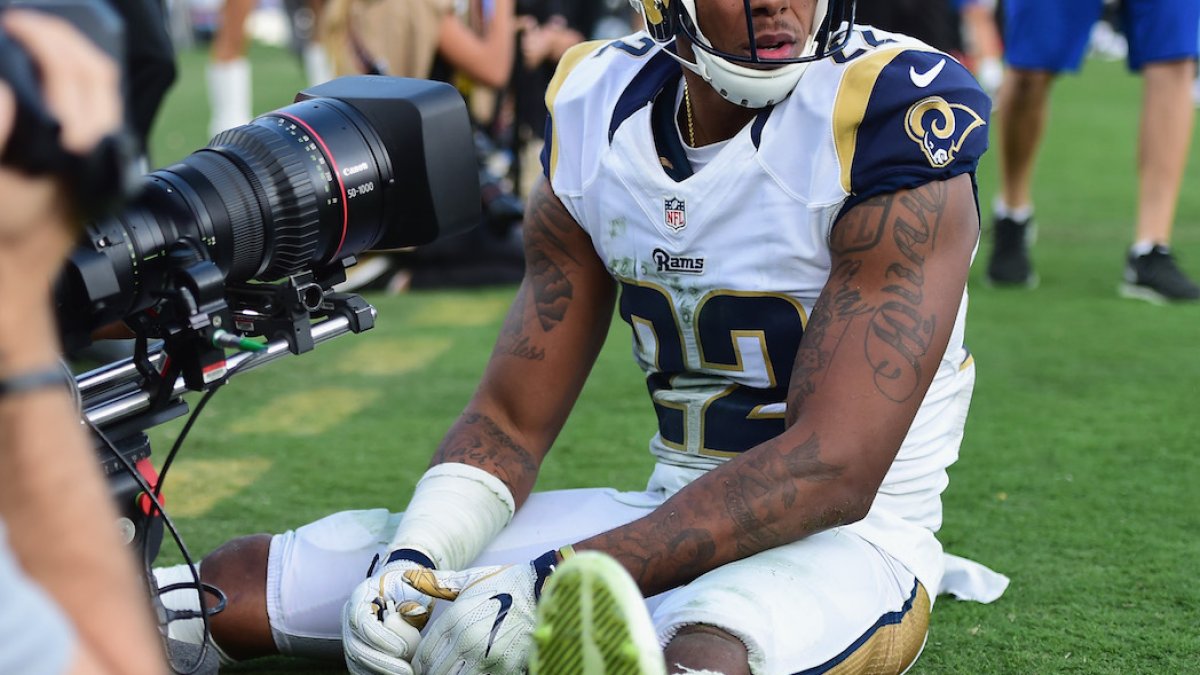The NFL franchise tag players have been determined for the 2017 season, and while only really two of the players tagged (RB Le’Veon Bell and DT Kawann Short) rank among the very best couple of players at their respective positions, there is one clear anomaly among the seven players that received the tag this year: CB Trumaine Johnson.
The franchise tag has become a mechanism teams use simply to prevent players from getting away, and usually serves as a stalling tactic to buy negotiation time so they can work out a long-term contract. Of the seven players to get tagged this year, I would expect at least five to work out a long-term deal with the team that tagged them sooner or later.
The rules change a little bit with quarterbacks, but outside of that unique position, the premise only makes sense if the player is good enough to warrant that much effort to keep him around, and that’s what makes tagging Trumaine Johnson a little bit strange.
Johnson has been franchise tagged for the second consecutive year, meaning the Rams aren’t just on the hook for the $14.2 million that any other cornerback would have received had they been franchise tagged, but for $16.7 million, or 120 percent of the franchise tag he received last offseason—such is the way the system works. That $16.7 million is a full 10 percent of the new salary cap figure of $167 million for 2017.
Johnson won’t actually be the highest-paid cornerback in the league this year, but he will be the second-highest, trailing only Washington’s Josh Norman in both cash earning and salary cap hit. His cap hit eclipses that of Arizona's Patrick Peterson and Seattle's Richard Sherman by more than $3 million each, and Denver's Aqib Talib by almost $5 million.
So just how far short of that elite level is Johnson? This past season, he ranked as the 26th-best CB by PFF grade, with a score of 81.0; a year ago, he was 25th (80.9). In abstract terms, 64 cornerbacks start in the NFL, with another 32 playing more often than they are on the bench given the propensity for nickel defense throughout the league, so ranking around the top 25 is far from a bad thing, but neither does it justify almost $17 million a season.
Though his coverage statistics fluctuated wildly over the last two years, Johnson’s coverage itself was actually remarkably consistent, at least in terms of a full season’s body of work. His issue, though, is that he can still perform at alarmingly differing levels depending on the game within a season, and in each of those two years, he has single-game grades as high as 89.4 and low as 39.5.
Johnson has the size (6-foot-2, 208 pounds) that NFL teams covet in today’s era of Julio Jones-style athletic freaks, but his career is a study in waiting for potential to be fulfilled, and the Rams have a lot of money riding on that horse coming in now.
For his career, he has allowed a passer rating of 72.6 when targeted, and he surrendered 10 career touchdowns. He tends to be a bend-but-don’t-break style of CB, who will give up catches but usually not catastrophic plays. In each of the past four seasons, he has allowed 60 percent or more of the passes thrown his way to be caught, which is at least 10 percent higher than the better players in the league, but they haven’t gone for more than 12 yards per catch in any of those four years. 66 cornerbacks in 2016 allowed more than 12 yards per reception, and he has only been beaten for two catches longer than 31 yards over the past two seasons starting for the Rams.
A season ago, the Rams elected to put the tag on Johnson and allow Janoris Jenkins to walk out of the door to free agency, where he signed a big-money deal with the New York Giants. Jenkins and Johnson were coming off very similar seasons in terms of grade, and that decision was something of a coin flip for the team given the evidence in front of them. The pair were two very different styles of cornerback, but the end result in terms of play was very similar. Jenkins dramatically outplayed Johnson in 2016, though, putting together the best year of his career by some distance, while Johnson could only tread water, at best.
The Rams now run the risk of doubling down on what looks to be a mistake, and rolling the dice once again on Johnson being able to take the same kind of step forward that Jenkins was able to for the Giants. If he can't, they are paying a CB who is a capable starter as if he is the best CB in the game.



 © 2025 PFF - all rights reserved.
© 2025 PFF - all rights reserved.